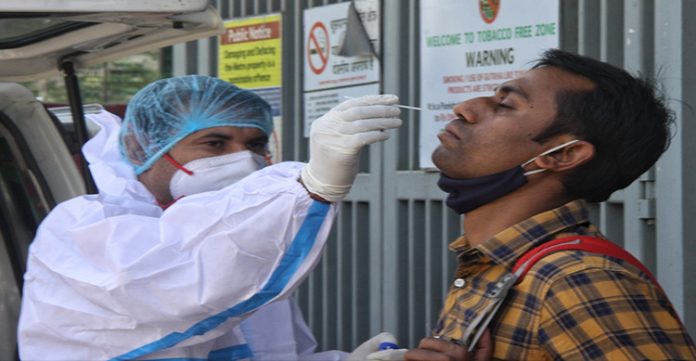While the second wave of coronavirus is lowering its grip on the country and states are easing their restrictions, a third wave is “inevitable” and will possibly hit India within the next 6-8 weeks, AIIMS Chief Dr Randeep Guleria said.
The increased duration between 2 doses of Covishield “may not be a bad” way of dealing with the vaccinations as it provides ample time to inoculate more people with the first dose, he added, as the prime necessity at the moment is to vaccinate everyone.
Speaking about the new Delta-Plus variant, developed from the Delta variant of covid-19, Dr Guleria underlined the need for a new frontier for India’s battle against the disease to study the mutating nature of the virus. The Delta Plus variant’s emergence has given fuel to the growing concerns regarding monoclonal antibody treatment.
ALSO READ: ICMR warns of Third Wave, Issues Guidelines
“As we have started unlocking, there is again a lack of Covid-appropriate behaviour. We don’t seem to have learnt from what happened between the first and the second wave. Again crowds are building up… people are gathering. It will take some time for the number of cases to start rising at the national level. The third wave is inevitable and it could hit the country within the next six to eight weeks… maybe a little longer. It all depends on how we go ahead in terms of Covid-appropriate behaviour and preventing crowds,” he said.
Currently, only about 5 per cent of the population is inoculated with both doses.
The AIIMS said that the third wave’s emergence depends on many factors and could take up to 3 months or even much lesser. Strict surveillance is required apart from following the covid norms. “Last time, we saw a new variant – which came from outside and developed here – led to the huge surge in the number of cases. We know the virus will continue to mutate. Aggressive surveillance in hotspots is required,” he said.
“Testing, tracking, and treating” should be the motto in every hotspot to keep down the number of covid cases, he stressed. Unless everyone is vaccinated, India cannot stay safe from the virus in the months to come, he added. The government aims to inoculate 108 crore people by the end of this year, out of the 130 crore population.
ALSO READ: Beware of Third Wave—Continue Precautions
“We have to factor in human behaviour while unlocking, which needs to be done in a graded manner,” Dr Guleria said. “Virus is still mutating, we need to be careful,” he said while speaking about the Delta variant of UK. 99 per cent of the new covid cases in the UK are attributed to the highly transmissible variant first found in India.
He expressed concerns over the decreasing gaps between the new waves and said, “During the first wave (in India), the virus was not spreading that rapidly… all that changed during the second wave, and the virus became much more infectious. Now the Delta variant that’s spreading is much more infectious. Faster spread is likely.”
Maharashtra, which is reporting about 1.4 lakh patients as of now, might register 8 lakh active cases in the third wave, experts warned.
“When there is a huge increase in the number of cases, shortage of (hospital) beds follows. The strategy should be multi-pronged – we have to make sure fresh cases don’t rise. Any healthcare system globally will tend to collapse with the unprecedented rise in infections,” Dr Guleria said.
On the subject of the 12-16 weeks gap between Covishield’s 2 doses, the AIIMS chief said that while “nothing is written in stone”, the nation needs to formulate new strategies with strong data to arrive at a decision. This should be based on science and not the shortage of vaccines in the country, he added.
“We need an aggressive genome sequencing to see how the virus is behaving. Does the vaccine efficacy come down, does the monoclonal antibody treatment work? To do all of that, we need to have a large or very good network of labs to study the data. I think that’s where to move in the next few weeks. And that’s the new frontier we need to develop if we want to succeed in our fight against Covid,” Dr Guleria explained about the Delta variant.







